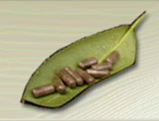 Sanskrit name: Asana, Beejak, Peetshal, Vijaysar
Sanskrit name: Asana, Beejak, Peetshal, Vijaysar
Botanical name: Pterocarpus marsupium
Habitat: Indian Kino Tree, found commonly in hilly regions of central and southern India & Ceylon. A moderate to large deciduous tree with a stout crooked stem and widely spreading branches, thick bark, yellowish gray and scaly. The older trees exude a blood red gum resin. The leaves are 15-23 cms. Long, bipinnately compound, leaflets are oblong, the flowers occur in large panicles, fruit pods 2.5-5 cms., orbicular, flat winged.
Energetics:
- Rasa (taste): Bitter, Astringent
- Virya (action): Coolig
- Vipaka (post-digestive effects): Pungent
- Doshas (constitution): Balances Pitta and Kapha.
General information
Indian Kino Tree helps in regulating blood sugar level and in the functioning of the pancreas. Thus helping in the treatment of Diabetes. As per Ayurveda it is beneficial for infants and women. Also, it is one of the herb used in Rasayna (Science of Rejuvenation).
Contraindications
No significant side effects information is available so far.

 Loading... Please wait...
Loading... Please wait...













